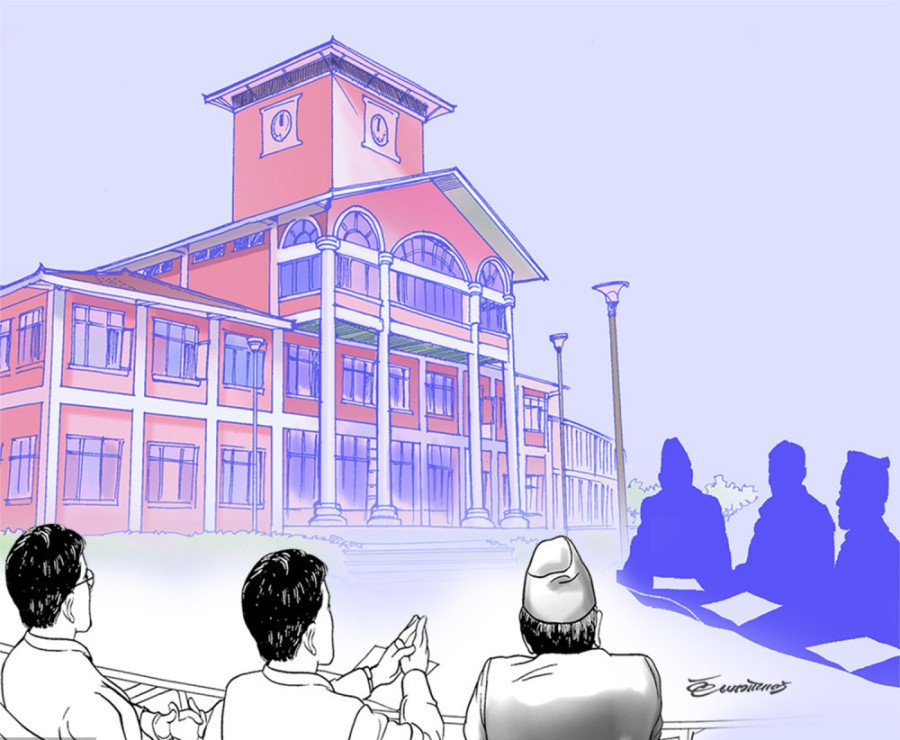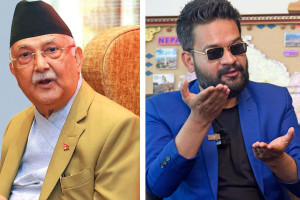Columns
Unshackling Tribhuvan University
Political interference is deteriorating the academic standard of Nepal’s pioneer university.
Pushpa Raj Joshi
Recent news that the registrar and the rector of Tribhuvan University (TU) were assigned personal security officers amid increasing security threats is not common. Academic institutions are considered to be peace zones. The global trend is that the state civil authorities, including the security forces, are not allowed to enter university premises without a warrant or consent from authorised university officials. On the contrary, our universities are increasingly turning into battlegrounds involving students, security forces and university staff. Even the country’s oldest and leading academic institution, TU, is gravely suffering from this delinquency.
Over the past few decades, TU has fallen into the tight grip of political partisanship. Recently, the part-time lecturers associated with various political parties locked down various university offices, demanding their unconditional permanent professorship through a fast-track. It is common knowledge that numerous appointments in TU—especially at leadership levels—have historically been subject to political quotas and alignments. This is supported by the fact that, earlier this year, the appointment of campus chiefs at 24 constituent colleges was reportedly distributed among main political parties such as the Nepali Congress, the CPN-UML, the Loktantrik Samajbadi Party and the Maoist Centre.
Similarly, the deans at various institutes and faculties were reported to be appointed on political favouritism sans meritocracy. Most importantly, the selection criteria for the appointment of the Vice Chancellor (VC), the academic and administrative head of the university, have been the individual’s alignment with the ruling political party and/or coalition. Academic achievements and professional experiences seem to be secondary and additional criteria for a VC.
The first and foremost institute of higher education, TU, was established in 1959 to shape Nepal’s intellectual landscape and produce skilled professionals. During its initial years, TU efficiently centralised higher education and rapidly expanded its reach regionally. Subsequently, TU became the sole university under the 1971 National Education Plan. The university is credited with producing the first and subsequent generations of highly skilled and competent professionals during those years. A majority of the current cohort of policy makers, legislators, administrators, security officials and judiciary staff are the products of TU.
Political partisanism
Although the political parties were banned during the autocratic Panchayat regime, free student unions affiliated with various political parties were allowed to conduct their activities within the university. During that period, the student unions were at the forefront. They served as the sole medium to promote the ideologies of their respective mother parties. They also played a vital role in raising political awareness and addressing student welfare issues within the university and affiliated campuses. Parties and their student wings had no direct influence over the university management. Leadership positions, including that of the VC, were awarded on meritocracy.
After the reinstatement of multiparty democracy and with increasing direct influence of the political parties on the academic institutes, the universities have been converted into political battlegrounds. The side effects of political partisanship have been clearly reflected by the declining academic standard of our universities, including TU. According to the report published by Times Higher Education (THE), the global ranking of TU is consistently plummeting. TU ranked 801-1000 globally in 2023. The ranking slipped to the 1201-1500 range in 2024, and further declined to 1501+ in 2025—the worst ranking, so far. This incessant decline in global ranking highlights a pressing issue within Nepal’s education sector that demands immediate attention and strategic interventions within TU.
Political interference is deteriorating the academic standard of the country’s pioneer university. Hence, to regain the lost glory of our higher education institutions, all universities, including the TU, must be transformed into autonomous academic institutions alienated from partisan politics. The first step could be transforming the politically aligned students’ unions into apolitical student councils meant solely for students’ welfare within the university. The university staff should also be barred from practising partisan politics within university premises.
Transparent VC selection procedure
To free the university from political influence, the selection procedure of the VC should be transparent and grounded solely in meritocracy. For that, an innovative, impartial and impactful methodology should be applied. So far, the VC selection committee has been formed solely by the prime minister in the capacity of the Chancellor. As the prime minister is a political entity, political bias in such a committee is obvious. Past incidents clearly justify this conception. Therefore, instead of this modality, a high-level VC selection committee including impartial and apolitical academicians from within Nepal and abroad should be formed, preferably by the university senate.
A machine-learning algorithm could be developed to transparently, impartially and efficiently evaluate the academic credentials and professional achievements of the aspiring internal and external candidates. The short-listed candidates should be invited to present their vision to all the faculty, teaching staff, invited reputed faculties from other universities and student representatives. The audience should be given the opportunity to evaluate the presentations by assigning numerical scores to the candidates. The candidate with the highest score should be appointed as the VC, with the condition that the presented vision must be implemented during his/her tenure. Subsequently, once the VC is appointed through this procedure, he/she should be allowed to work independently throughout the tenure.
If such an automated VC selection procedure could be implemented in TU and other universities, the persistent controversies related to the VC selection procedure will be decreased, and a visionary and capable candidate will be selected to lead the university. Additionally, an apolitical supervisory committee, including renowned academicians, should be formed to oversee the progress of the university as per the vision of the appointed VC. This innovative VC selection process will set a precedent for the free and fair appointment of VCs also at other universities, helping to safeguard academic institutions from partisan politics. This might prove to be an efficient initiative towards detaching our universities from the claws of partisan politics.
To sum up, the ongoing problems of TU can only be resolved if the university is detached from pervasive partisan politics. Diminishing political influence would allow TU to regain its long-lost academic excellence and improve its global standing as the country’s pioneering higher education institution. If the university is reoriented towards its true academic mission rather than serving as a political battleground, its staff would no longer require personal security officers.




 21.12°C Kathmandu
21.12°C Kathmandu















